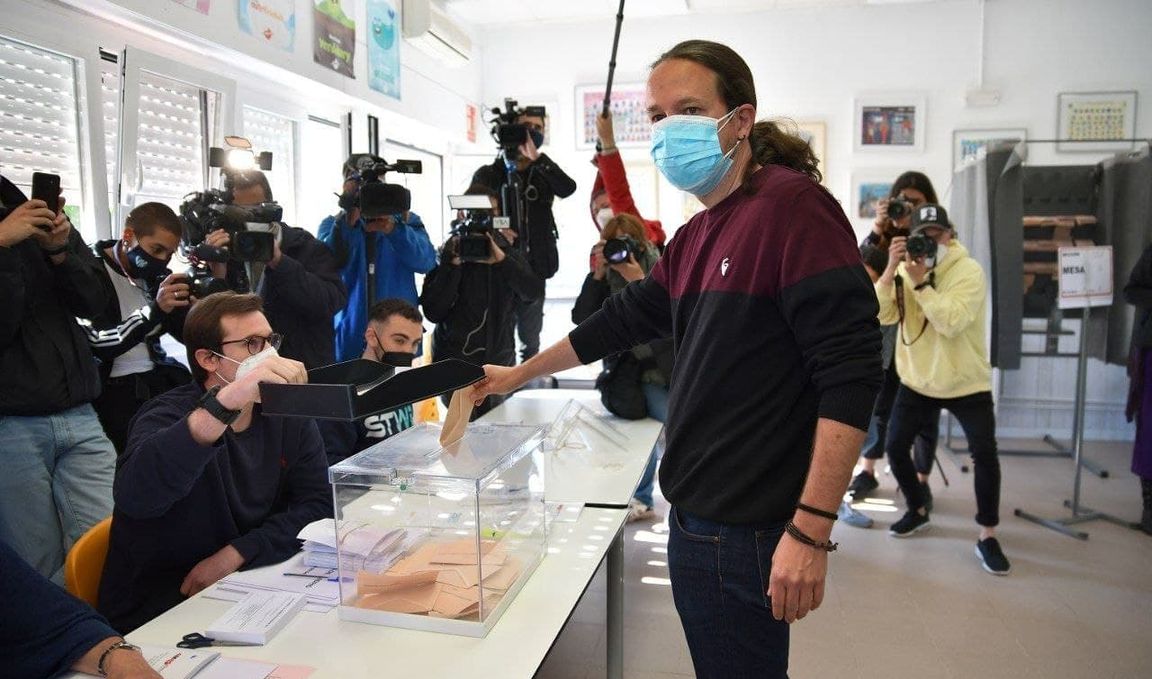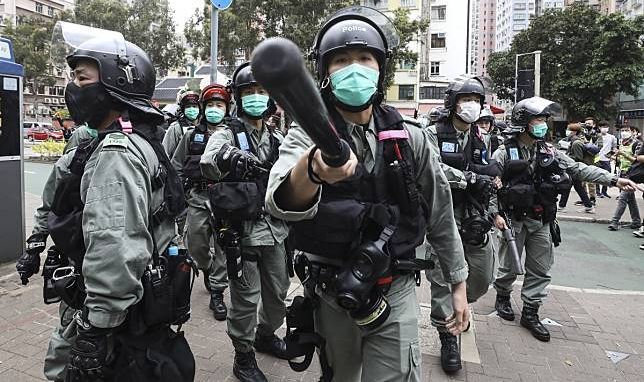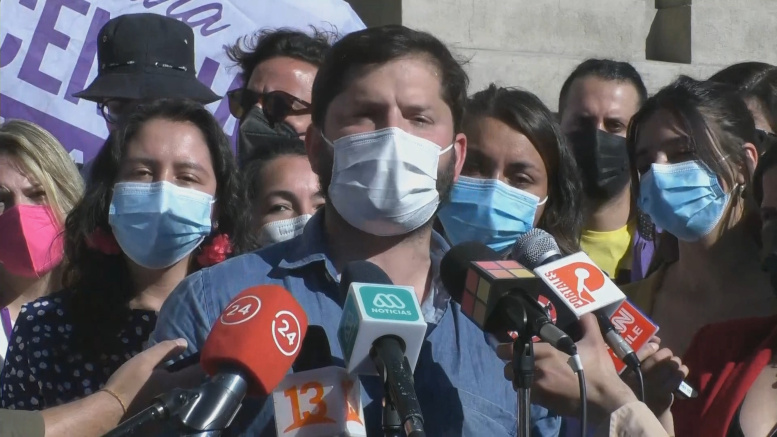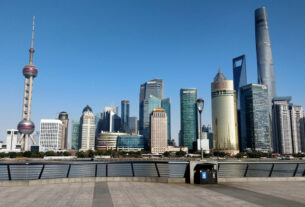John Hird is a member of Socialismo Revolucionario (ISA in the Spanish State).
In a very polarised election the right-wing People’s Party have won a clear victory at the expense of the centre right Ciudadanos party and former left party PSOE.
The clear victory of the right-wing People’s Party (PP) in the Madrid regional elections will be a bitter pill to swallow for workers, youth and all those who have suffered over the last year in the COVID19 pandemic. Health workers especially, who have valiantly tried to overcome the abysmal and at times criminal management of the crisis by the PP regional government, led by Isabel Diaz Ayuso, will be trying hard to understand what has happened. At the beginning of the crisis in March, 2020 elderly residents of privatised retirement homes were literally left to die by the Madrid government.
Participation in these elections was up 11% on 2019 at 75.9%, which is high for a regional election. This reflected the polarised atmosphere during a campaign in which Pablo Iglesias, Unidas Podemos’ leader who resigned as Vice President of the Spanish government to lead the party’s campaign, and other left leaders were sent bullets in the post and death threats.
There are clear electoral winners and losers. The PP have increased their number of seats by 35 and gained over 864,000 extra votes. The right populist Ciudadanos’ party lost all of their 26 seats and over 500,000 votes which probably went mostly to the PP. The neofascist VOX gained one more seat, 13 in total, and an extra 35,000 votes.
PSOE, the former social democratic party which leads the Spanish government, were the big losers, going from the biggest party with most votes and seats in 2019 to the third party behind Más Madrid, the moderate split from Podemos.
Ayuso and the PP will be able to form a government with the support or abstention of Vox.
Despite a high profile campaign led by Pablo Iglesias, Unidas Podemos (UP) only gained three more seats and a moderate increase in votes.
Elections are always only a snapshot of moods and developments in society but the Madrid elections do raise some fundamental questions which Marxists need to address seriously.
Do the election results represent a shift to the right in Madrid and the Spanish State?
The PP and Vox posed the elections as a choice between “Freedom or Communism” while Iglesias countered it was about “Democracy or Fascism.” As previously mentioned Pablo Iglesias received four bullets in the post with a death threat against him and his partner and parents. In a radio debate, he challenged the Vox candidate to condemn the death threats, and when she refused to, he walked out of the debate, followed by the candidates of PSOE and Más Madrid.
Pablo Iglesias was correct to resign as Vice President and run in the Madrid elections and take on directly the PP and Vox. His campaign has woken up many workers and especially the youth to the threat represented by the far right but it was too little too late unfortunately. Furthermore, Iglesias was tainted by his involvement in the coalition government.
Socialismo Revolucionario – ISA in the Spanish state — argued at the time of the formation of the PSOE – UP coalition government, that instead of joining, UP should have supported the formation of a PSOE government from the outside to block the right, while retaining its political independence in opposition. Being part of the PSOE government left UP even more isolated from the workers and the struggle in the streets. We said, “This withdrawal from the streets and full entry into the institutional game had already caused UP to lose many votes and seats during the last elections, and its support base could be further diminished in favour of other forces that are perceived as more “anti-system.” From this point of view, the far right Vox could position itself as an anti-system force and rally even more support.”
Unfortunately this perspective has been borne out by events and now Iglesias has announced his resignation from the leadership of Podemos, and from politics altogether, due to the failure of his strategy.
As it happened, Ayuso managed to ride out the scandal of the deaths in the elderly care homes, the consequences of years of PP under investment in the Madrid health service which has meant the number of COVID19 cases are higher in the region, and their general mis-management of the crisis. Ayuso posed as a sort of Spanish Trump, defending the “freedom” to keep the economy going against the impositions of the PSOE government. Invoking the “liberty” of madrileños, she disregarded the government’s recommendations to shut down the capital’s vibrant nightlife in response to the pandemic, and has insisted on keeping bars and restaurants open, despite some of the country’s highest COVID-19 infection rates. Ayuso, with the help of the press managed to mobilise a layer of small business owners in her favour in the elections.
Ayuso and the national PP leader, Pablo Casado, are posing their victory as the first step to get rid of the Spanish government led by Pedro Sánchez. “¡Madrid es España!” (Madrid is Spain) they cried on election night as they received the congratulations of VOX.
Vox openly call for all parties which support the “breakup of the Spanish State,” including the pro-independence parties in Catalonia and the Basque country, to be banned! The success of the right in Madrid will further exacerbate the unresolved national questions.
The elections were an opportunity and a test for the left. At the beginning of the campaign Iglesias offered to wage a joint campaign with Más Madrid to unite against the right. His former comrade Iñigo Errejón, now a leader of Más Madrid, and its associated Mas Pais in the Spanish parliament, and the Madrid candidate Mónica García refused. The disunity of the left is a demoralising factor for many workers and youth. Despite the increased turnout in the elections, over 1 million people still did not vote in the elections.
The Madrid elections revealed a further polarisation of society, between classes, regions and the historic nations. It has also put on the table the actual policies of PP and their junior partners Vox.
Vox committed itself to a set of demands made by the ultraconservative Catholic organisation Hazte Oír (Make Yourself Heard) before the elections. The six-point list includes a commitment to block access to the right to abortion and euthanasia, and to repeal regional laws protecting people against discrimination on the basis of their sexual orientation.
In 2019, Hazte Oír financed a bus to tour the country, to campaign against “feminazis” and Spain’s gender violence law. The main message on the bus read: “It’s not gender violence, it’s domestic violence.” The bus also featured an image of Adolf Hitler wearing makeup and the symbol of feminism on his military cap, above the hashtag “#StopFeminazis.”
But it is not just Vox which supports these ultra-reactionary ideas. Before Ayuso was named Madrid president the first time, she told EL PAÍS in January 2019 that “abortion is not the right of a woman.” Her other statements included: “I’m worried that the father is never considered and it is almost used as a contraceptive method” and “I am not criminalising anybody, but a very high percentage [of women who have abortions] are immigrants or women without resources who are doing it for the second or third time.” If Ayuso tries to make those backward views a reality as President of Madrid, imagine the response she will get on the streets from women!
Tasks before the left
The Madrid elections show clearly the tasks before the left. The right and ultra-right are organised and have a vision of what they want to achieve. Their reactionary discourse has become normalised in the press and even on the daytime chat shows.
The left needs to develop activists and leaders who have the courage to call out the fascists, but who also boldly go beyond a vague and nice defence of “democracy” and spell out a radical program which will bring real change to the lives of working class people. The ultra-right and fascist ideas will be defeated by working class unity around a program to transform society. A call to maintain the status quo does not inspire and will only embolden reaction. Particularly in the midst of the Covid crisis it needs to mobilise around a program that can provide free quality health care for all, and guaranteeing that incomes and living standards are protected.
Indeed, the propaganda techniques that Vox utilised were already tried and tested in Germany by the Nazis.
Vox attacked the cost to the Madrid region of unaccompanied migrant minors on giant billboards, and the words used to dehumanise Pablo Iglesias, such as “rat” and “hunchback,” mirroring strategies used by Hitler’s Nazi Party to win over millions of desperate Germans in their drive to persecute and annihilate not only the Jews but also the disabled and sick.
The victory of the right in Madrid is a serious warning blow, and the left needs to discuss it openly and urgently with all those sections of society who want to resist. It is particularly urgent to address the improved result VOX achieved in some working class neighbourhoods and launch anti-racist and anti-fascist campaigns, especially amongst the youth. VOX has even formed a reactionary “trade union,” named Solidaridad.
Clearly the result was a protest vote against the policies of the coalition government and their handling of the COVID19 crisis. During the last year, workers have put their lives at risk and kept the economy and society going, yet there have been almost no authentic voices in parliament articulating the needs and aspirations of the working class. No voices raised against the banks, multinationals and big companies profiteering in the pandemic and sacking workers. Despite the PSOE-UP coalition there has been no discussion of a socialist program in parliament to get us out of this mess. The defeat is also the heavy price paid by the left around UP, for participating in the PSOE government which is based on a nebulous “national unity.” This has meant there has been no real political opposition to the Ayuso Madrid regional government’s handling of the COVID19 crisis, despite the burning anger of workers especially frontline health workers.
Socialists and working class people cannot “resign” from the class struggle. Many will be disappointed at what has occurred in Madrid, but the conditions of everyday life force us to keep fighting. Part of that fight is to understand.
Pablo Iglesias is stepping back from politics, we urge activists to step forward and to join the struggle to arm the movement with clear socialist ideas.




